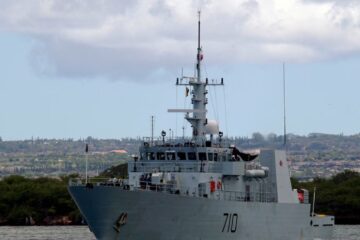Halifax Shipyard press release
The launch of the fifth of six AOPS for the Royal Canadian Navy, marks a significant milestone for Canada’s National Shipbuilding Strategy (NSS) and the revitalization of the Royal Canadian Navy’s combatant fleet.
A full two months ahead of schedule, the 103-metre future HMCS Frédérick Rolette transitioned from Halifax Shipyard’s land-level facility to a submersible barge on December 8 and launched in the Bedford Basin today.
The ship, constructed by over 2,400 shipbuilders, is now pier side at Halifax Shipyard where work continues in preparation for sea trials and handover to the Royal Canadian Navy in September 2024.
Inside Halifax Shipyard’s facilities, the Royal Canadian Navy’s sixth AOPS, the future HMCS Robert Hampton Gray and the first AOPS variant for the Canadian Coast Guard are under construction, with work progressing as planned.
A generation of shipbuilders will deliver six AOPS for the Royal Canadian Navy, two AOPS for the Canadian Coast Guard, and 15 Canadian Surface Combatant ships for the Royal Canadian Navy as part of the NSS.
“The launch of future HMCS Frédérick Rolette is another milestone achieved on our mission to deliver ships for Canada. I’m proud of the teamwork that delivered this result”.
Dirk Lesko, President of Irving Shipbuilding Inc.
Charles Frédérick Rolette was born in Québec City on September 23, 1785, and joined the Royal Navy as a midshipman while a young teen. He distinguished himself during the War of 1812, earning a reputation as a bold and quick-thinking officer. The historical Canton of Rolette, located on the south shore of the St. Lawrence River, roughly 50 km southeast of the town of Montmagny, Québec, near the American border, was established in 1868 in his honour.
Just before the outbreak of the War of 1812, Rolette was posted to Amherstburg, Upper Canada (now Ontario) as Lieutenant in command of the brig General Hunter. When word of the outbreak of war reached Amherstburg on July 3, 1812, Rolette acted immediately, capturing an American vessel, the Cuyahoga, before the American crew even realized that their country had declared war on Britain. This was the first action of the War of 1812 and a significant prize as the Cuyahoga carried the American commander General William Hull’s papers and dispatches. This provided the British with significant early intelligence on American strength and deployment.
At a time when it was not yet customary to award medals to military personnel in recognition of conspicuous gallantry, Lieutenant Rolette was mentioned in dispatches by senior military officers on several occasions during the war. At the capture of Detroit, Major-General Isaac Brock praised Rolette’s conduct in the highest terms: “I have watched you during the action,” said the general, “you behaved like a lion, and I will remember you.”
– End –






